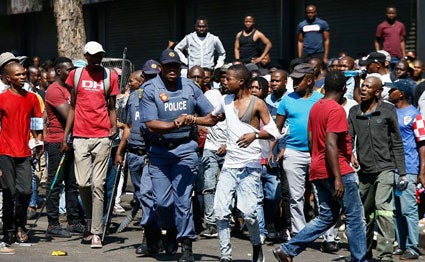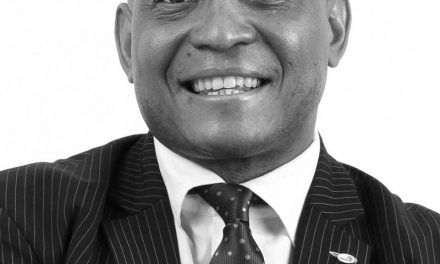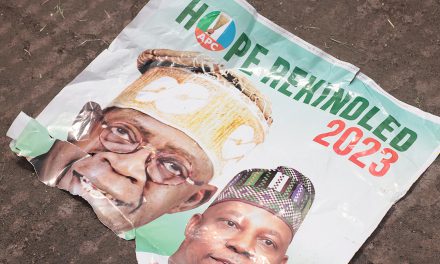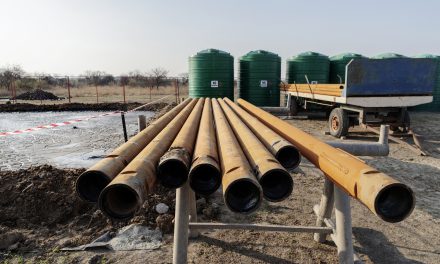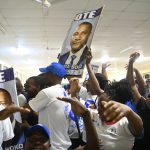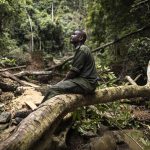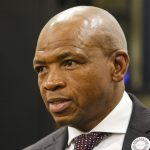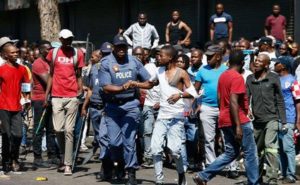
South African Police Service members rescue a man from angry taxi drivers during a riot near the Bloed Taxi Rank on August 28, 2019, in Pretoria, South Africa. PHOTO | PHILL MAGAKOE | AFP | DAILY NATION
Many will read with dismay this week’s resurgence in xenophobic attacks against Nigerians in South Africa (SA). For me particularly, this latest episode hits home in a personal way. Nigeria may need to recall its envoy from that country and lead coordinated African responses to stop the mayhem. It’ll signal that Nigeria and Africa intends to join hands to address this and that it cannot just be business as usual. We can ensure justice and the rule of law for all law abiding residents of SA, native or foreign.
Dangerous Oblivion
I spent this last weekend of 1 September unaware of what had gone on elsewhere in Johannesburg. Reason was my quiet stay-in in the relative comfort the secure Edenvale area of Johannesburg. It had been my hideaway from the bustling city since arriving there on Saturday 31st August. This two-days stopover before flight to Lagos followed attendance at the African Leadership Forum (ALF) in Dar-es-salaam. There, I had been invited by the former Tanzanian President, Benjamin Mkapa and the Uongozi Institute.
I enjoyed my time in friendly Dar, engaged in eye-opening exchanges with President Obasanjo and at least five other former and current African presidents in attendance. I also tweeted excitedly about Dimowo Cosmas, the young Nigerian who emerged runner-up in the ALF awards. Done with my two days of work in Dar inputting into the leaders’ discussions my views as expert on African extractive governance, I flew out to Johannesburg. I had in total spent six weeks traveling across the Middle East and Europe far from my daily hustle in Lagos.
This long background is necessary as I got that close to the mayhem without realising. I ventured out on Sunday 1 September to nearby Festival Mall in Kempton Park, close to OR Tambo airport in Johannesburg. Not only did I shop for personal items on which I made significant cost savings relative to Nigeria, I also bought an emergency phone charger from a shopkeeper. He greeted me as I drove up close to his stall entrance.
It turns out he is Nigerian. So good had been our business transaction and courtseying that he told me as I was leaving that he bears one of the popular Eastern Nigerian names. His shop is located close to the entrance to the famous Kempton Park taxi rank (bus park in Nigerian speak).
Near death experiences in paradise
I had a close shave with death in South Africa about a year and 9 months ago. I arrived in Johannesburg on Christmas Eve on the way to Pretoria to join my family members who had earlier flown to SA. We were all headed for Safari at the Hluhluwe Mfolosi national Park in Kwa-Zulu Natal province.
My elderly taxi man, whose persistence and appearance had convinced me against the more prudent and safer alternative of taking a registered airport car hire or Uber that late in the night, turned out to be a murderer. Only a mix of cajoling, prayer and mother luck saw me escape the close shave. He was armed with a pistol! I gladly parted with wads of cash in gratitude for being spared.
Similarly, I had lost my laptop to a gang that specialized in “jamming” remote controlled car keys. This prevents car doors from locking. Once unsuspecting drivers depart in the illusion of having locked up, the hoodlums get free access to valuables in their cars. My encounter with them was at the Sunnypark Shopping Centre in Sunnyside, situated close to the Jakaranda-leaf-festooned seat of power in Pretoria, South Africa.
I will return to my experience of Sunnyside and its particularly Nigerian flavour that is not to my taste. If only to present an account that is more balanced than the one-sided one narrative South Africans often peddle about Nigerians. And indeed the unannounced victim narrative held by many less well-informed Nigerians at home. Lest I forget, my car was also once wrongfully towed from around this same mall, released only after being extorted. I gave 1000 Rands (then worth about US$ 75) to the official-cum-criminal towing gang.
Don’t get me wrong. I had called Cape Town, SA home from 2012-15, and took my girlfriend there to live with me after my more than 15 years residency in the UK and Spain. Only marginally shaded by Madrid – which was special for meeting with my future wife – Cape Town afforded me much professional fulfilment and social stimulation. I still look back to the place with fondness. And I go back every February for the Mining Indaba.
My home in Cape Town, with the weekly work jaunts to Johannesburg and Pretoria, in many ways was a midway house. Between a thriving African city and an orderly European metropolis like Berlin. How can one hate that country where one married his longtime heart-throb and also gave birth to one’s two kids? Nevertheless, of the three times that I have been victim of crime, all occurred in SA and the perpetrators were SA citizens.
Close shave with death at Kempton?
I might have just escaped death by the whiskers. For my charger did not work to my satisfaction and I ventured back few hours after the purchase to see if I could exchange at the vendor’s. On parking right outside the shop, I noticed that the usually bustling shops around Kempton Park taxi ranch were under locks.
I inquired first with two stern-looking locals who told me that they were not aware of the reason why all the shops were locked. In retrospect, I realise that my Nigerian kaftan surely gave me away and their merely not volunteering information was in fact a favour of some sort. I could have been lynched. More enquires with a second person, and came back the retort: there had been looting and violence. If I had arrived a few hours earlier, in my full Nigerian regalia, and alighted from my car into the hands of the looting mob, my likely fate is better left to the imagination.
Complacency kills
I have this week seen at least two videos circulating on WhatsApp of two South Africans wanting foreigners out. One of them ostensibly a senior police functionary, justifying some of the violence against foreigners. The senior functionary was suggesting that foreign-owned businesses took away opportunities from South Africans! He claimed South Africans were neglected by the country’s authorities whilst conferring unspecified advantages on non-SA citizens.
This is not new: there is a shocking immunity with which some in SA have for long been allowed to instigate and perpetrate genocidal outrage. Left to fester, including during the time of Malusi Gigaba as SA’s home affairs minister, the frequency of these attacks soon reached a feverish tempo. The utterances of the Zulu King, Goodwill Zwelithini kaBhekuzulu, which many construed (I’ll say rightfully) as incitement to violence some years back also come to mind.
Complex reality dangerously oversimplified
Is it true that all Nigerians are criminals as many South Africans are wont to believe? The answer lies in the social and economic position South Africans occupy in their own society. For those working in top universities and health institutions, to name just two of the sectors where Nigerians have made significant contributions to that country, a caricature of Nigerians as criminals is one they would hardly recognise.
It is also true that there are hundreds of Nigerians who engage in serious criminal activities in South Africa of the type that Nigerians themselves here at home will not condone. Nevertheless, criminal law enforcement should be allowed to take its course. Punish those found complicit. They should face the full wrath of South African law. To tarnish the majority of law-abiding, hard-working Nigerians in SA with the broad brush of criminality is ill-informed and unacceptable.
I often walked the streets of Sunnyside in Pretoria. Whether daytime or nighttime, I will be confronted by sights of loitering Nigerian young men. They discuss loudly in Ibo or Yoruba subjects like the results of English premier league games in a manner that might appear a mass brawl to the unaccustomed.
I’ve also experienced Nigerian nightclubs that play music at an unacceptably loud pitch. In clearly residential neighbourhoods in Pretoria. The South African trope that some Nigerians are rude is also true. I’ve witnessed a few fellow Nigerians ordering meals at restaurant, addressing waiters in languages that will be deemed uncivilized anywhere in the world.
There’s truism in the observation that criminal gangs – Nigerian, Ukrainian or Indian – thrive in SA because the police is compromised. Some SA men also fret that Nigerians “take their women”. If any Nigerian behaving brashly gets confronted and clobbered around the head by disaffected South Africans, one may not protest too much. There is a need fundamentally to be respectful of the society where one lives and to be law-abiding.
I am in no way condoning violence. Just to make the point that the blanket, indiscriminate violence visited on Nigerian shop-keepers by SA looters and other such acts (which also affects Somalis, Mozambicans, Bangladeshi merchants and others) has really now come to a head. We’ll only stop these and other dastardly SA crimes with determined Nigerian and coordinated African actions to compel corrective actions in SA.
Recall our envoy and expel theirs
We have seen in Nigeria rising anti-SA sentiments connected to the xenophobic attacks. The ire has sometimes been directed at MTN, the SA telecommunications giant which has Nigeria as its largest and most lucrative market. Attacks against that entity or other SA ones may not be the most prudent. These are companies that employ tens of thousands of Nigerians and have also increasingly become part of our national economic fabric. MTN recently listed on the Nigerian Stock Exchange. One should not cut his nose to spite his face.
It would be more astute if Nigeria’s government could grow some balls to confront SA this time in a manner similar to the tit-for-tat expulsion of citizens over yellow fever cards some years back. In that episode, SA fired the first shot but was persuaded ultimately to call for a ceasefire. That was given the robust and uncompromising Nigerian response.
With this latest xenophobic orgy targeting Nigerians, President Buhari has despatched a “special” envoy to meet SA president, Cyril Ramaphosa. The SA leader is a well-traveled, diplomatic and successful businessman. He must know how damaging these persistent attacks are for SA’s image in Africa and its ambitious corporate brands. Or has his infamous, and increasingly ineffective balancing act politics, tied his hands from acting?
If so, Abuja should immediately recall the Nigerian High Commissioner from Pretoria. Unless Buhari sees serious concerted SA actions to punish perpetrators. Those actions have to be on a level so compelling that Buhari can allow Nigeria to be persuaded to hold return fire. Nothing to lose here really. Our dignity and precious Nigerian lives are daily being trampled. Enough is enough!
Oladiran (Ola) Bello obtained both his MPhil and PhD degrees in International Relations from the University of Cambridge and also holds a First Class BSc degree from the Obafemi Awolowo University, Ile-Ife. He has worked for organisations including the United Nations (New York) and Management Systems International (Washington DC), Merchant International Group (London) and Arthur Andersen (later KPMG). Dr Ola Bello has more than 10 years of experience in research and policy advisory, including on governance and extractive sector reform; sustainable development; and international development cooperation (including in EU-Africa relations). He spent three years with FRIDE (Spain) managing a donor-funded programme on the EU’s role in managing fragility and resource governance in select African countries. In 2012-2015, he was Head, Governance of Africa’s Resource Programme (GARP) at the South African Institute of International Affairs (SAIIA) and also functioned as head of SAIIA’s Cape Town office. Ola is spearheading GGA's technical support to Nigerian reform, including delivering ethics training for senior Nigerian judicial officers and change-makers (2017-2019). He's also working to expand GGA's role as in-country resource centre for multilateral consultative missions to Nigeria's ministries and parastatals. These missions include the UNECA/AU mineral sector governance team.

